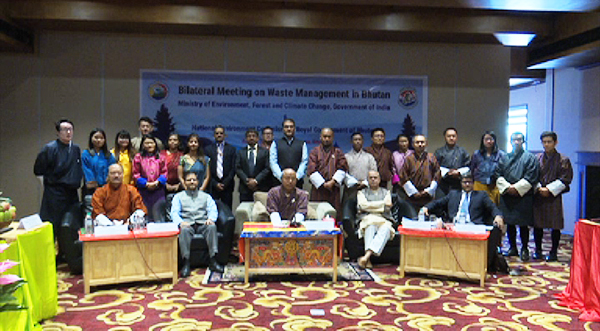 Gearing up towards zero waste by 2030 mission, the National Environment Commission (NEC) met with the delegates from the Ministry of Environment, Forest and Climate Change (MoEFCC) of India today. The meeting discussed collaborating in technical and financial assistance to address the waste management issues and challenges between the two countries.
Gearing up towards zero waste by 2030 mission, the National Environment Commission (NEC) met with the delegates from the Ministry of Environment, Forest and Climate Change (MoEFCC) of India today. The meeting discussed collaborating in technical and financial assistance to address the waste management issues and challenges between the two countries.
Some of the challenges Bhutan today face are illegal dumping of wastes, storage facilities for medical or bio-hazardous wastes, expertise in electronic waste management, specialists in wastewater treatment and coordination between the agencies.
“We had submitted a proposal of about Nu 1.6bn. It covers in terms of waste collection and management, waste treatment and disposal, awareness-raising and capacity building. We will build a program based on our proposal and we have all the experts here to build it so that we can have a project covering all the elements fully securing financing and technology and capacity building through experts from India,” Sonam P Wangdi, the NEC Secretary, said.
The meeting is an outcome of the visit of the Environment Secretary of India, C.K Mishra in April where NEC requested the Government of India to help with waste management programs in Bhutan.
“Based on the experience sharing, we will try to work out a way forward where maybe we can have MoU between the two countries in the areas of cooperation. And also see on a long term capacity building, on institutional reforms and frameworks,” said S.P.S Parihar, the Chairman of Central Pollution Control Board, MoEFCC.
“We have large scientific manpower which is technology and expertise in waste management processing, collection, transportation. So we would be happy if that scientific manpower could be used for whatever purposes that we need to do over here. In terms of financial support, the Government of India and Government of Bhutan are mutually in touch to try and support a few projects as necessary”.
The NEC also developed a national waste management strategy (NWMS) with the overall aim to prevent and minimise the generation of waste at source and to divert materials for recycling, re-used following the concept of a circular economy.






